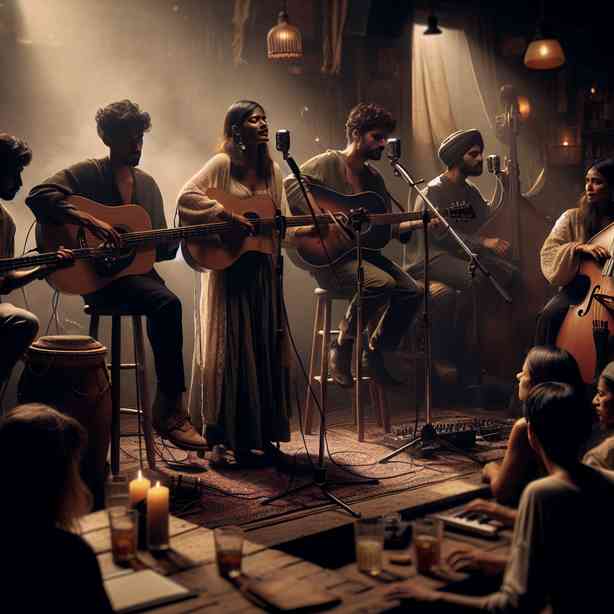
Unplugged performances have gained immense popularity over the years, primarily due to their unique and intimate nature. These performances strip away the elaborate setups typically associated with the mainstream music industry, offering both artists and audiences a more raw and authentic experience. In this exploration, we delve into the significance of unplugged performances, their evolution, and some fascinating examples that illustrate their impact on music.
To begin with, the term “unplugged” refers to a type of live music performance where artists use acoustic instruments instead of electric ones. This trend gained significant recognition in the early 1990s, particularly following the advent of MTV’s “Unplugged” series. The show featured some of the biggest artists showcasing their talents in a more simplified format, allowing their musical skills and emotional depth to shine through. This format not only redefined the way artists interact with their music but also set a new precedent for live performances.
One of the key benefits of an unplugged performance is its ability to foster a deep emotional connection between the artist and the audience. Without the distraction of flashy lights and heavy electronic sound, listeners are encouraged to focus on the lyrics, melodies, and the artist’s vocal delivery. This intimate setting allows for a profound appreciation of the music, as it highlights the artistry behind the songs. For both the performer and the audience, it can feel like a shared experience, bringing them closer together in the moment.
Moreover, unplugged performances often encourage artists to reinterpret their own songs, breathing new life into familiar tunes. By stripping back the arrangement and reimagining a song acoustically, artists can reveal different facets of their work. This creative process not only showcases their versatility but also invites audiences to engage with the music on a deeper level. For example, when a rock band presents their heavy-hitting tracks in a softer, acoustic format, listeners often discover new meanings and emotions within the lyrics.
As the trend of unplugged performances continues to evolve, many contemporary artists are embracing this stripped-down approach to reach their audiences. The rise of social media platforms and digital streaming has revolutionized how music is shared and consumed, but the allure of an authentic acoustic experience remains undeniable. Artists like Ed Sheeran, Taylor Swift, and even emerging musicians have mastered the art of unplugged performances, captivating audiences worldwide through their heartfelt renditions.
In addition to fostering connection and creativity, unplugged performances have also played a significant role in the music industry by challenging traditional ideas about commercial success. In a world where polished production often takes center stage, the power of simplicity can serve as a reminder that at the heart of it all, music is about expression and connection. As industry metrics become more focused on numbers and statistics, unplugged performances champion authenticity, encouraging artists to remain true to their craft rather than conforming to commercial pressures.
Furthermore, these performances often extend beyond just music; they foster a sense of community and shared experience among attendees. In a concert setting where everyone is focused on the raw talent of the musician, listeners often feel more inclined to connect not just with the artist, but also with each other. This communal aspect of unplugged performances can create lasting memories and a shared bond among fans, encompassing a deeper understanding of the music being shared.
Some iconic unplugged performances have left an indelible mark on music history. For instance, Nirvana’s MTV Unplugged session in 1993 is frequently cited as one of the best live performances of all time. The band’s choice of predominantly acoustic arrangements showcased not only their musical prowess but also their artistic depth. The performance is often remembered for its haunting rendition of “All Apologies” and the emotional vulnerability displayed by frontman Kurt Cobain.
Similarly, Eric Clapton’s MTV Unplugged concert in 1992 provided a poignant moment for fans, especially with his acoustic version of “Tears in Heaven.” The performance became a powerful tribute to loss and love, resonating with listeners worldwide. Clapton’s ability to translate his emotions into music in such an intimate setting remains a benchmark for aspiring musicians.
Moreover, the evolution of unplugged performances also crosses into various genres of music. While the trend may have initially been dominated by rock and pop artists, it has since permeated genres such as hip-hop, country, and even electronic music. Artists like Post Malone and Hozier have embraced acoustic renditions, often surprising audiences with their versatility and authenticity, proving that unplugged performances can resonate across diverse musical landscapes.
Another noteworthy aspect of unplugged performances is their potential for collaboration and creativity. These settings often encourage artists to join forces, leading to unforgettable collaborations that might not occur in more traditional performances. The synergy that arises in an unplugged session can lead to spontaneous creativity, as artists bounce ideas off one another in an environment that nurtures artistic expression.
In conclusion, unplugged performances serve as a testament to the power of simplicity in music. They remind us that at their core, songs are about connection, vulnerability, and shared experiences. As audiences increasingly seek authenticity and genuine engagement with artists, unplugged performances remain not just a trend, but an essential part of the music landscape. They encapsulate the essence of what it means to be human—sharing stories, emotions, and experiences through the beautiful medium of music. As we look to the future, it is clear that unplugged performances will continue to inspire, engage, and connect artists and audiences alike, transcending mere entertainment and becoming a profound cultural experience.


